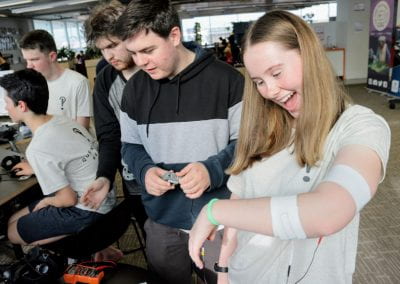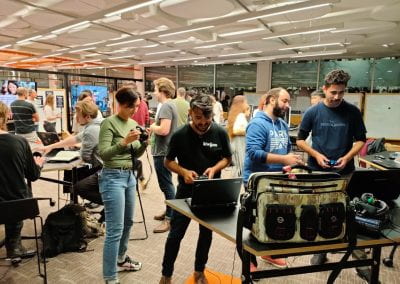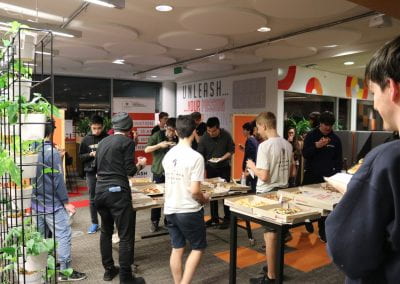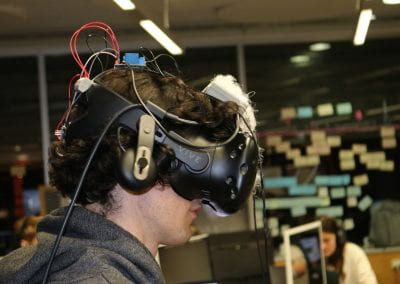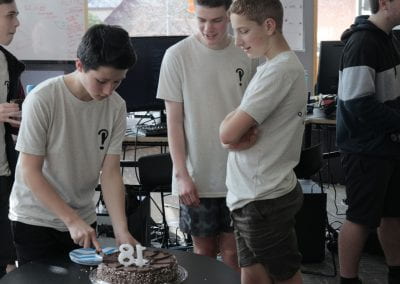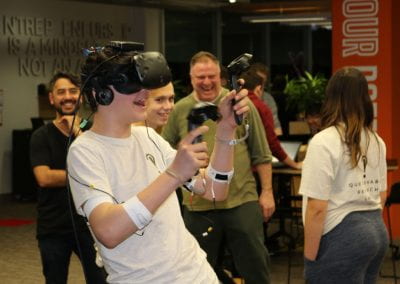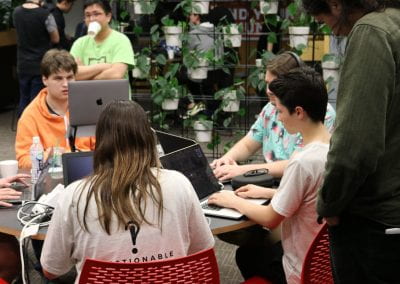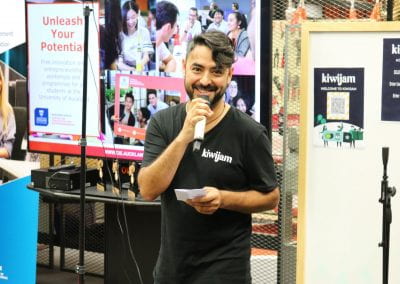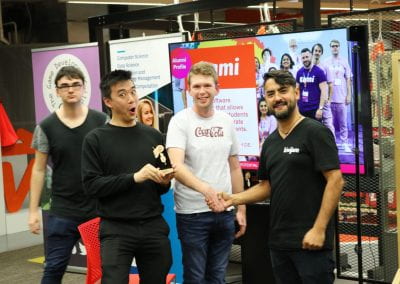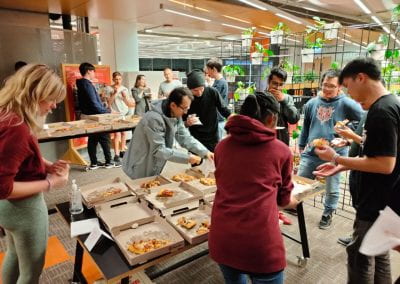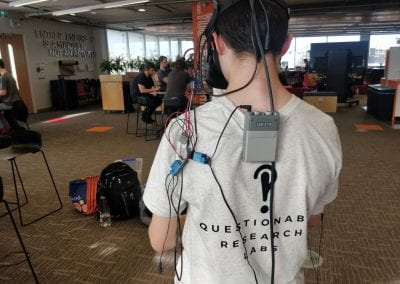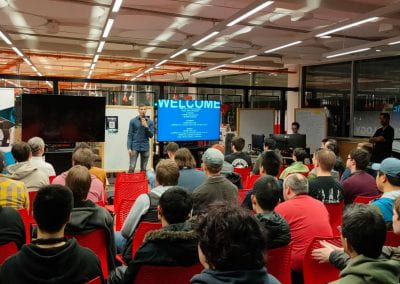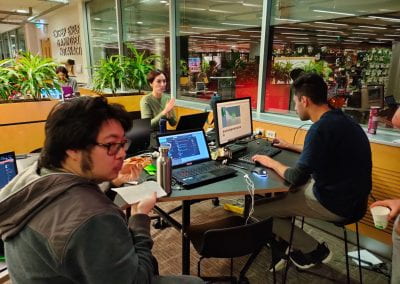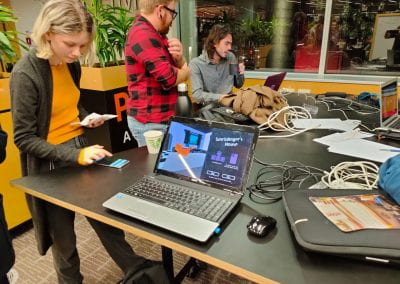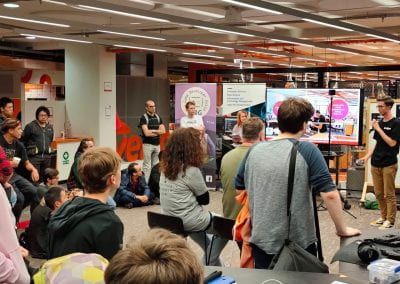
NEWSROOM
Unleash Space electrifies gaming hackathon
4 August 2020
A gaming hackathon hosted by the Business School’s Centre for Innovation and Entrepreneurship brought together dozens of current and future game developers including high school students, university students, university staff and game development professionals.
Over the course of 48 hours Kiwijam participants formed teams and developed games that addressed the hackathon’s theme. This year’s theme was “On the Brink”. By the end of the weekend prototypes for 33 games were produced including Kakapo Frenzy (keep farming and no kakapo dies), Put Stuff On Christie Brinkley, and Schrödinger’s House (stop cats from knocking crockery off kitchen benches). Questionable Research Labs, a group of high-school students from Whangarei, designed a game using TENS electrostimulation pads. When firing a gun in their game, the pads shock your arm into contracting, giving the sensation of recoil. Kiwijam co-host Zac Miller-Waugh says “It was great to hear lots of screaming from that side of the room this year!”
This was the first year that Kiwijam had been held at Unleash Space. Zac says the university’s innovation hub and makerspace was an ideal venue. “Kiwijam is about celebrating experimentation, success, and failure. Unleash Space is the perfect space for experimentation and collaboration like this – there were plenty of whiteboards, moving TVs which one team used for a live Trello board, rearrangeable seating and desks, and lots of power and internet. Our participants loved it.”
Kiwijam was organised by current engineering, science and business students of the University of Auckland along with CTO of Ara Journeys Ben Kenobi. The event is designed to give participants the opportunity to experiment, network and foster the potential for New Zealand’s gaming industry. This year’s keynote speaker was Dean Hall, CE of RocketWerkz, who gave a talk on the value of prototyping.
The game development industry in New Zealand earned $203.4 million in 2019, double what it made in 2017. Zac says that this is hopefully just the beginning. “There are some fantastic things happening in the New Zealand game development industry, with new indie games gaining traction and international success. The “kiwi” brand of games is diverse and creative, but those creating new studios and games often have to work through trial and error, then self-fund their attempts at success. I would love to be able to see more support and funding from the government and universities to encourage game start-ups in the same way the film industry has. With the right support, this could continue to grow into a massive, long-lasting industry.”


4 August 2020
A gaming hackathon hosted by the Business School’s Centre for Innovation and Entrepreneurship brought together dozens of current and future game developers including high school students, university students, university staff and game development professionals.
Over the course of 48 hours Kiwijam participants formed teams and developed games that addressed the hackathon’s theme. This year’s theme was “On the Brink”. By the end of the weekend prototypes for 33 games were produced including Kakapo Frenzy (keep farming and no kakapo dies), Put Stuff On Christie Brinkley, and Schrödinger’s House (stop cats from knocking crockery off kitchen benches). Questionable Research Labs, a group of high-school students from Whangarei, designed a game using TENS electrostimulation pads. When firing a gun in their game, the pads shock your arm into contracting, giving the sensation of recoil. Kiwijam co-host Zac Miller-Waugh says “It was great to hear lots of screaming from that side of the room this year!”
This was the first year that Kiwijam had been held at Unleash Space. Zac says the university’s innovation hub and makerspace was an ideal venue. “Kiwijam is about celebrating experimentation, success, and failure. Unleash Space is the perfect space for experimentation and collaboration like this – there were plenty of whiteboards, moving TVs which one team used for a live Trello board, rearrangeable seating and desks, and lots of power and internet. Our participants loved it.”
Kiwijam was organised by current engineering, science and business students of the University of Auckland along with CTO of Ara Journeys Ben Kenobi. The event is designed to give participants the opportunity to experiment, network and foster the potential for New Zealand’s gaming industry. This year’s keynote speaker was Dean Hall, CE of RocketWerkz, who gave a talk on the value of prototyping.
The game development industry in New Zealand earned $203.4 million in 2019, double what it made in 2017. Zac says that this is hopefully just the beginning. “There are some fantastic things happening in the New Zealand game development industry, with new indie games gaining traction and international success. The “kiwi” brand of games is diverse and creative, but those creating new studios and games often have to work through trial and error, then self-fund their attempts at success. I would love to be able to see more support and funding from the government and universities to encourage game start-ups in the same way the film industry has. With the right support, this could continue to grow into a massive, long-lasting industry.”
EMAIL
CIE@AUCKLAND.AC.NZ
POSTAL ADDRESS
THE UNIVERSITY OF AUCKLAND BUSINESS SCHOOL
PRIVATE BAG 92019, AUCKLAND






